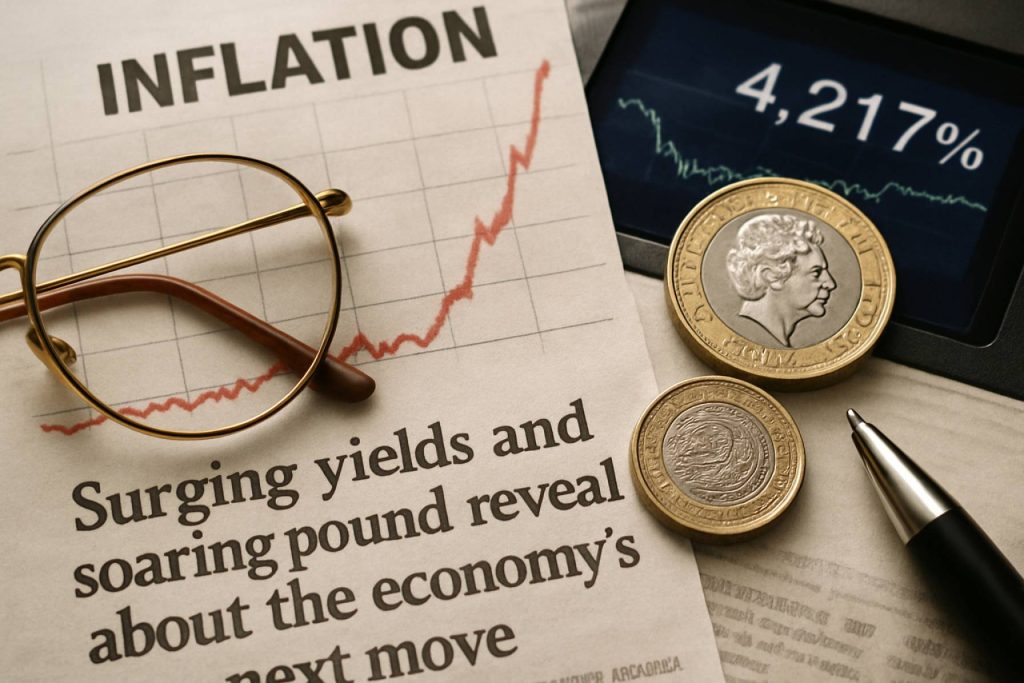
- UK inflation exceeded forecasts, surprising financial markets and shifting expectations.
- Government bond yields jumped as traders anticipated delayed Bank of England rate cuts.
- Sterling surged to its highest since February 2022, reflecting renewed investor optimism.
- Options markets indicate long-term pessimism towards the pound has faded.
- Persistent inflation suggests interest rates may remain high, impacting growth prospects.
- Major banks signal global investors are reassessing British assets amid shifting sentiment.
Early morning sunlight crept across the stately streets of London as financial markets braced for another typical day. But the air crackled with surprise when official numbers revealed that UK inflation had jumped higher than economists’ cautious forecasts.
Within seconds, the City’s traders sprang into action. UK government bonds — known as gilts — tumbled amid a sudden rethink of the economic landscape. The two-year gilt yield, notoriously sensitive to changes in central bank policy, surged three basis points, reaching a seven-week high at 4.08%. The market’s message was clear: rate cuts from the Bank of England may be further away than anyone hoped.
Yet it wasn’t only the bond market whipsawing. The pound — long battered by years of volatility — staged a vigorous rally. Sterling galloped as much as 0.6% higher, to $1.3469, a level untouched since February 2022. For seasoned currency traders, this was a seismic shift: for the first time since the global financial crisis, options markets no longer bristled with long-term pessimism toward Britain’s currency.
- Stronger inflation stokes confidence that consumer demand is holding up
- Markets rethink how quickly the Bank of England can ease interest rates
- Sterling’s rise marks a dramatic turn in market sentiment
The implications are profound. Inflation running hotter than anticipated signals a robust — if unpredictable — economic pulse. Many in the City had expected falling prices might usher in near-term interest rate cuts. Instead, policymakers may keep borrowing costs higher for longer, taming inflation but risking slower growth.
Currency experts at institutions like HSBC and JPMorgan Chase acknowledged that traders are no longer betting against the pound for the long run. This newfound optimism, or perhaps a breather from years of gloom, means global investors are peering anew at British assets.
The tug-of-war between inflation, interest rates, and currency strength leaves economists and ordinary Britons alike pondering what lies ahead. For those tracking every blip in the bond and currency markets, the day’s action was more than numbers on a screen. It was a clear signal: the UK’s economic path is shifting, and the world is watching.
You Won’t Believe the Double-Edged Impact of the Latest UK Inflation Spike!
-
Pros:
UK inflation running hotter than expected boosts confidence in consumer demand and suggests economic resilience.
Sterling’s sharp rally against the dollar signals renewed global appetite for British assets and reduces long-term market pessimism, as highlighted by analysts at HSBC and JPMorgan Chase.
-
Cons & Limitations:
The sudden inflation surprise forced investors to brace for delayed rate cuts from the Bank of England, increasing uncertainty for borrowers and businesses.
Keeping borrowing costs high may help tame inflation, but risks slowing down the wider economy and squeezing household budgets.
-
Controversies:
Some economists argue that persistent high inflation is masking deeper structural problems and could cause pain for lower-income Britons if wage growth fails to keep pace.
Market optimism about Sterling may be short-lived if future policy moves by the Bank of England disappoint or if external shocks hit the UK economy.
You Won’t Believe What’s Next For UK Markets: Future Trends and Shocking Predictions!
-
Uncertain Path for Interest Rates:
Analysts at the Bank of England are expected to delay rate cuts, with markets now forecasting that higher borrowing costs could persist well into the coming year. This cautious approach aims to combat persistent inflation, but may pose headwinds for growth.
-
Sterling’s Resurgence:
Major banks such as HSBC and JPMorgan Chase predict continued optimism for the pound. As global investors shed long-held pessimism, sterling’s recovery could accelerate, attracting new capital into UK assets.
-
Global Investors Take Notice:
The recent surprises have sparked renewed global interest, with institutions evaluating opportunities in the UK after years of volatility. Experts suggest Britain could become a hotspot for international investment—provided stability continues.
-
Persistent Inflation Pressures:
Looking ahead, stronger consumer demand and ongoing price pressures are likely to keep inflation above target for the near future. This scenario supports robust economic activity, but means both households and businesses should brace for elevated costs in coming years.
-
UK Bond Market Volatility:
Bonds (gilts) are expected to remain volatile as traders gauge every signal from the Bank of England. With rate-cut timing in flux, investors should prepare for sharp moves over the next 12–24 months.
Conclusion: Experts from top banks and economic agencies agree: volatility is far from over, but with newfound optimism, the UK’s financial outlook could surprise. Watch this space as the economic landscape shifts and opportunities arise.



